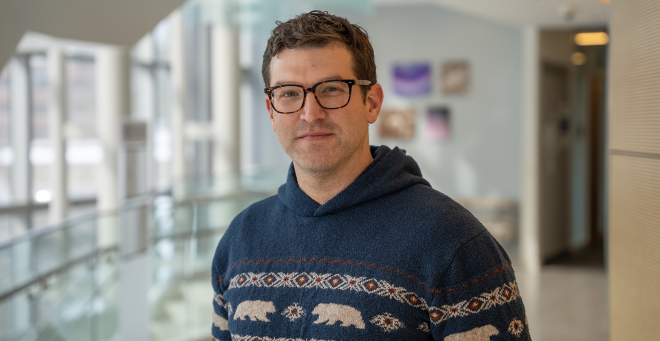
Photo: Hallie Leo
Multiple research projects examining the underlying biology of opioid use disorder and the role of sleep and circadian rhythms in relapse vulnerability are underway at UMass Chan Medical School in the lab of Ryan W. Logan, PhD, professor of psychiatry & behavioral sciences.
Dr. Logan is a principal investigator on three recently funded National Institutes of Health (NIH) grants, totaling nearly $10 million in research support.
“With these grants, we’re very much interested in how sleep and circadian dysfunction contribute to opioid addiction, relapse and vulnerability, but also how chronic opioid use and chronic drug use can impact sleep and circadian rhythms in the brain and body that might lead to worsening our progression of the addiction state,” Logan said.
Logan and colleagues aim to find new treatment avenues for opioid use and psychiatric disorders. They will use single-cell transcriptomics data from human and animal model brain tissue to study long noncoding RNAs as potential molecular mechanisms in opioid use disorder and HIV, identifying transcriptional rhythm alterations in the brains of people with opioid use disorder. The team will also produce genomic predictions to study how genetic differences affect addiction and sleep.
Logan is collaborating with Chan Zhou, PhD, assistant professor of population & quantitative health sciences at UMass Chan; Marianne Seney, PhD, associate professor of psychiatry at the University of Pittsburgh; and Andreas Pfenning, PhD, associate professor of computational biology at Carnegie Mellon University.
“Through active, successful collaborations across disciplines, expertise and resources, our lab is able to conduct this work,” Logan said.
Logan said his lab uses human tissue and animal models to understand more about the mechanisms of disease. He said his lab is fortunate to receive the grants and have access to pre- and post-treatment biological samples to continue their work.
“Over the past year, momentum has grown to scale back some research because key public health metrics like opioid overdose deaths have been decreasing, largely due to improved access to treatment, overdose-reversing medications, and medications like buprenorphine and methadone,” Logan said.
“Despite current treatments that are very effective in getting people back to being functional, 95 percent of people relapse regardless of those treatments,” he said. “Our goal is to understand the underlying biology that contributes to these risk factors that drive someone to relapse and how sleep and circadian rhythms might contribute to relapse.”
In August, Logan was promoted to vice chair of translational research in the Department of Psychiatry & Behavioral Sciences. He joined the UMass Chan faculty in January 2023.


